#Capetian France
Text
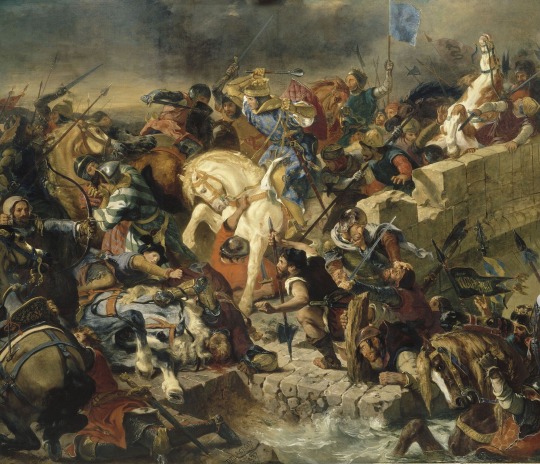
The Battle of Taillebourg, 21 July 1242 by Eugène Delacroix
#battle of taillebourg#art#eugène delacroix#middle ages#medieval#history#knights#france#louis ix#saint louis#french#europe#saintonge war#saintes#versailles#capetian#angevin#england#english#bridge#henry iii#charente#river#kingdom of france#kingdom of england#alphonse of poitiers#hugh x of lusignan#richard of cornwall#mace#king
131 notes
·
View notes
Text





My Medieval 12th century inspired art book zine "If All The World Were Mine!" Is now available to order! Thanks everyone who signed up to my notification list, and bought it at the show! I had a great time sharing it with everyone hehe.
I have a tier for just the zine itself, as well as for a full-package deal with prints (Sacral Anointment and Blood of the Vassals!) and Melusine + Bestiary stickers.
The zine is 52 pages, in full color, and has a collection of my favorite pieces from the past couple years, including some of my nsfw arts. There are a couple of new illustrations I haven’t yet shared publicly, so can’t wait for everyone to see them!
Get it while it's hot, here on my storenvy while my stock lasts :D
(For those asking: i Do plan to make a digital version available! But for the digital version, I’d like to add more pages and more content. So it may take a little longer. If you’re not already on my list, please fill out my google form to be notified when it’s available!)
#store#shop#zines#if all the world were mine#medieval#12th century#the plantagenets#capetians#angevin empire#philip ii of france#philip augustus#melusine#yaoi#medieval art#pinup#historical#historical rpf
27 notes
·
View notes
Text

Albigensian Crusade.
#royaume de france#capétiens#louis viii#roi de france#vive le roi#crusades#crusader#kingdom of france#capetians#Albigensian Crusade#royalry#Croisade des albigeois#cathar crusade#croisade contre les albigeois
12 notes
·
View notes
Text

Louis IX of France, and a Page
Artist: El Greco (1541–1614)
Depicted People: Louis IX of France
Genre: Portrait
Date: 1592
Medium: Oil on Canvas
Collection: Louvre Museum
Louis IX, also known as Saint Louis, was King of France from 1226 until his death in 1270. He is widely recognized as the most distinguished of the Direct Capetians. Following the death of his father, Louis VIII, he was crowned in Reims at the age of 12.
#portrait#louis ix of france#16th century art#el greco#greek painter#16th century france#french culture#french royals#french monarchy#spectre#crown#capetian dynasty#melancholy#male#ruler
5 notes
·
View notes
Text
Capétiens vs Plantagenêts: a matter of suzerainty.
It was also his position as suzerain which gave Louis VII the chance of interfering in and inflaming the quarrels which raged in the Angevin family. This was an effective means of weakening his great antagonist. Henry II and Eleanor produced a large family, and reared four of their sons to the age at which custom demanded that they should be provided for. Their eldest son Henry was granted Normandy in October 1160 and was associated with his father on the throne of England in 1170. Richard was given Aquitaine in 1169 and Geoffrey Brittany in 1175. John, the youngest child of Henry and Eleanor, was not old enough to be entrusted with any estates until the very last years of his father's reign, and by the time he came of age all the available lands had been given away. As Duke of Normandy, Duke of Aquitaine, Count of Poitiers, the sons of Henry II came to perform homage to the King of France and became his men. It was in vain that Henry II sought to utilise the Norman procedure of pariage to maintain the unity of his continental territories in favour of his eldest son, the "Young King" Henry. (Under pariage the eldest son succeeded to all the heritable property and was alone answerable for it to the suzerain; each of his brothers received a share, but held it of him). This device could not be put into full operation in Aquitaine, which was not part of Henry's heritage but Eleanor's. And when she granted it to Richard, he owed homage not to his father or his eldest brother, but to the King of France. The Young King Henry had done homage as Duke of Normandy to Louis VII in October 1160. When he repeated his homage in 1170 it was made to embrace Anjou, Maine, and Brittany as well. At the same time Richard did homage to Louis for Aquitaine.
It is true that in 1174 Henry II compelled his sons to perform homage to him after their rebellion, but this new homage did not necessarily annul their homages to the King of France. Henry II himself had done homage to Louis VII in 1151 and again in 1169, and was to perform it yet again to Louis's successor, Philip Augustus, in 1180. Thus throughout the conflict between Louis VII and Henry II the French king's suzerainty was affirmed and recognised. This did not save Louis from defeats at his vassal's hands. Nevertheless, to judge from the Toulouse affair in 1159, Louis' suzerainty occasionally cramped Henry's style, and put him in the wrong in the eyes of contemporaries, including the barons of his continental fiefs. To play the rebel vassal was hardly prudent for a king when many of his own vassals were rebelliously inclined. It was not that the idea of rebellion itself shocked feudal society. On the contrary, it was one of the legitimate courses open to a vassal needing to safeguard his rights against the encroachments of his suzerain. But in the disputes between Louis VII and Henry II, Henry was the law-breaker as well as the vassal in revolt. For his rebelliousness against an impeccable suzerain there could be no justification.
It may be objected that Louis VII was constantly intriguing with Eleanor of Aquitaine and with Henry II's sons. But after all Eleanor, as Duchess of Aquitaine, was herself a royal vassal. Two of Henry's sons had done homage to Louis. Another, Geoffrey, by dint of his father's vassalage, was the French king's rear-vassal. And the king had, as suzerain, not merely the right but the duty to concern himself with the welfare and harmony of his great vassal's family, to ensure that a proper settlement was made on the sons. It would be unfair to accuse Louis of hypocrisy; nor did Henry ever complain that the French king was making trouble in his family. Louis' own grievances against Henry were many and varied, and Henry never made a serious effort to deny their validity.
Thus from 1154 to 1180 Henry II had the appearance of a vassal engaged in unjustifiable revolt against his suzerain. This line of conduct undermined his own position. It constantly reminded the baronage of the Angevin fiefs that the King of France was Henry's suzerain- if only because his suzerainty was so often invoked. And it helped to prevent the fusion of the individual elements of the Angevin empire on the continent. Provincial separation, already too strong for Angevin rule to subdue, was reinforced.
Robert Fawtier- The Capetian Kings of France
#xii#robert fawtier#the capetian kings of france#louis vii#henry ii of england#aliénor d'aquitaine#henry the young king#richard the lionheart#geoffrey plantagenêt#john lackland#jean sans terre
9 notes
·
View notes
Text
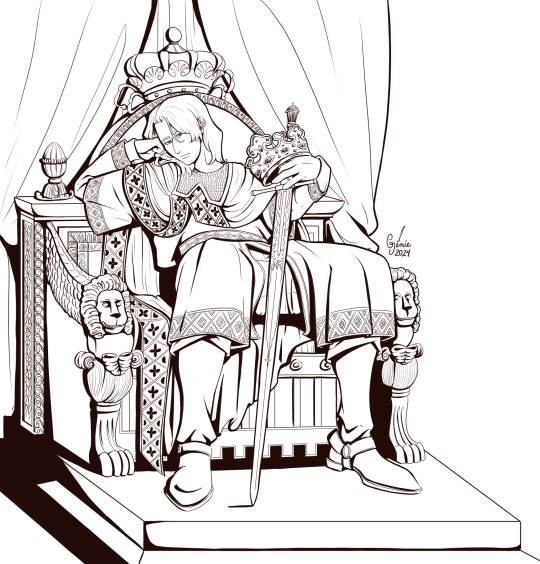
The House of Capet.
987-1328
The Capetian dinasty was the first French dinasty resulting after the death of Louis V (c.967-987) last Frankish king of the Carolingian Empire. In my HC, this Frankish personification is father of both France and HRE, and also Austria. After the colapse of the Carolingian empire, the Kingdom of Francia disappeared and the empire was partitioned in three big territories; West Francia (France), East Francia (HRE) and Middle Francia (the territories that the both of them will be fighting for in the centuries to come, the Benelux spawned from those territorial wars in between them, as well and Switzerland and everything in between).
France and the Holy Roman Empire would become natural enemies, then, as Franco's inheritance would be the same as that of the Carolingian Empire; to become the next Roman Empire. And both kingdoms would spend the rest of the centuries until the World Wars trying to achieve that inherited goal. It has a name, in fact; Franco-German enmity.
Hence, then, the name Holy Roman Empire, from the intentions to become the next great empire uniting the three continents. France is the older son, by the way. The Frank had... a little favoritism towards the youngest, because it was identical to him. And more visibly German, of course. This fueled the competition between the two and the hereditary and historic animosity between the two "princes".
It was the Franks that started the monarchical rule, feudalism and the hereditary rule for the sons in Europe. So France, HRE and Austria would be the first princes, haha.
#hetalia#aph fanart#aph france#francis bonnefoy#hws france#historical hetalia#myart#As always this are my HCs based on historical events#no one has to agree with them or anything
248 notes
·
View notes
Photo

Medieval Brittany, 9th-14th century
« Atlas historique de la France », Les Arènes, 2020
by cartesdhistoire
The Brittany peninsula experienced an influx of people in the 6th century, including invaders from England. An independent Brittany emerged amidst the fragmentation of the Carolingian Empire and Viking raids. Nominoë, appointed representative of the emperor, established his sovereignty after defeating Charles the Bald at the Battle of Ballon in 845. His son, Erispoë, became king of Brittany in 851. Armorica became a duchy in 939 but remained de facto autonomous, under the influence of the Plantagenets (1148-1203) and then the Capetians (1203-1341). Brittany became a duchy-peerage of the Kingdom of France in 1239. In 1491, Duchess Anne married King Charles VIII of France, initiating a process that culminated in the Edict of Union definitively attaching Brittany to the kingdom in 1532.
Breton is spoken west of a Plouha-Loudéac-La Roche-Bernard-Batz line, which has remained relatively stable over time. From the 9th century, the entire eastern area of Brittany spoke Gallo, an Oïl dialect related to Norman and Angevin. This region includes Dol, the seat of the archbishopric until 1199, and cities such as Nantes and Rennes, where the States of Brittany convened from 1352.
The administrative language of Brittany was not Breton but Latin. French began to appear in the 1240s and became widely used between 1250 and 1280, a trend observed in other French regions during the same period. From the mid-13th century, counts of Champagne favored French for their feudal affairs. The Count of Blois definitively abandoned Latin in favor of French from 1267. The Dukes of Burgundy extensively used the vernacular language during the second half of the 13th century, with French becoming their exclusive language from Duke Eudes (1315-1349). Paradoxically, French only became the dominant language of the Chancellery of the kings of France later, under Philip VI (1328-1350).
82 notes
·
View notes
Text












Women’s History Meme || Sibling Relationships (1/5)
↬ Berenguela, reina de Léon y de Castilla and Blanca de Castilla, reine de France
Queen Berenguela of Castile (1180–1246) was, in her lifetime and for some time thereafter, a dominant figure on the political landscape of the kingdoms of Castile and Leon. She typified the medieval elite woman whose ordained role in life was to be a wife and mother. The political circumstances of her native Castile, however, complicated and even enhanced Berenguela’s reproductive responsibilities. As the eldest daughter of Alfonso VIII of Castile and his wife Leonor of England, Berenguela was at different points in her young life the presumed heir to the throne. The Castilians adhered to the Visigothic principle of partible inheritance. Although favoring sons, this principle meant that daughters had a claim to inheritance. Therefore, it was possible for a woman to inherit the throne when a male heir was lacking as had happened with Alfonso VI’s daughter Urraca in 1109 and with Berenguela in 1217. Berenguela’s awareness of and concern for her own lineage derived not only from a strong, involved identification with her natal family, based on her position as her father’s daughter, but also from her awareness of her own self as an element of that lineage.
Her experiences and activities can be usefully contextualized by those of her numerous and important sisters, especially Urraca, Blanche, Leonor, and Constanza. They show ways in which Berenguela was like other elite women; indeed, her life could have turned out very much like one of theirs. Despite their individual circumstances, together they help demonstrate ways in which Berenguela was and was not alone in her experiences of family, marriage, motherhood, religion, and, above all, gender. Furthermore, the sisters were key elements of Berenguela’s family; throughout their lives, they remained in contact, if only for seemingly political reasons at times. Family visits, the fostering of children, and prayers for the dead suggest affective bonds as well as a deep sensibility of filial and sisterly piety among the members of this family.
Berenguela’s sister Blanca (1188–1252) is better known as Blanche of Castile, queen of France, one of the most famous women of the Middle Ages. From the time of her marriage to the French heir Louis, Blanche was destined for significance, even if only as another female link in the seemingly miraculous chain of male inheritance that had secured the Capetian throne for generations. Three years after Blanche’s husband Louis became king, he was dead, and Blanche became regent both for her young son, Louis IX, and for the kingdom of France. Blanche became queen of France at a time when the institution of queenship seems to have undergone a shift, becoming increasingly relegated to the private, domestic world of the queen’s own household; at the very least, there is a change in the way documentation presented the queen’s activities at court. Although Blanche’s own political experiences were particular to her Capetian context, examining the several parallels between her experiences and those of her sister Berenguela points to certain consistencies in thirteenth-century royal motherhood and queenship.
— Berenguela of Castile (1180–1246) and Political Women in the High Middle Ages by Miriam Shadis
[old version]
#women's history meme#berengaria of castile#blanche of castile#house of ivrea#house of capet#medieval#spanish history#french history#european history#women's history#history#nanshe's graphics
32 notes
·
View notes
Note
Is this plausible?
The king,had a beautiful wife whom he loved dearly,and despite her unknown, questionable origins that initially had people oppose their marriage,he didn't care and made her his wife and queen. He made sure she was treated right and dressed her in the finest silks and jewelry.
On the day she gives birth with his heir,the king receives a letter stating that the child is not his. attached with the hairpin of his wife which got lost before she got pregnant by a month . On his way to question his wife though,he hears of her death while delivering the baby. So he is just left with that anonymous letter,his (or not?) Baby and his doubts. He never really knew his wife.Yes he doted on her ,but she never really talked about anything about herself. So there's this inner feeling,that gawks at him saying: " why can't you just dismiss this letter as some joke ? Don't you know her ? Can she really do that to you? Didn't she love you?" Did she though? She never uttered these words.Did she ? So the king in the end believed this letter to be true. He tucked the letter somewhere and didn't say a word. He neglected his kid and went on to marry another woman,a princess of another kingdom this time to the people's joy.had another two kids ,a boy and a girl.
Later the current queen ,wants to get the heir out of picture so her son can get the throne. As she is of the few that knew that he wasn't really the king's son,she took the opportunity to poison the king's ear of how they simply can not let him ascend the throne. While they can't skip the succession line and can't tell the people because of the amount of ridicule and shame the king would recive,she says she will take care of it and later schemes accidents that paints the heir as " mentally ill" so the king would have a reason to skip him in the succession.
It is plausible. While not hairpins, tokens were used to plant doubt about a royal's lineage in the Tour de Nesle affairs in Capetian France. The mental illness gambit was used once or twice in history, there's speculation that neither Joanna of Castile or Ludwig II of Bavaria were actually mentally ill.
18 notes
·
View notes
Text
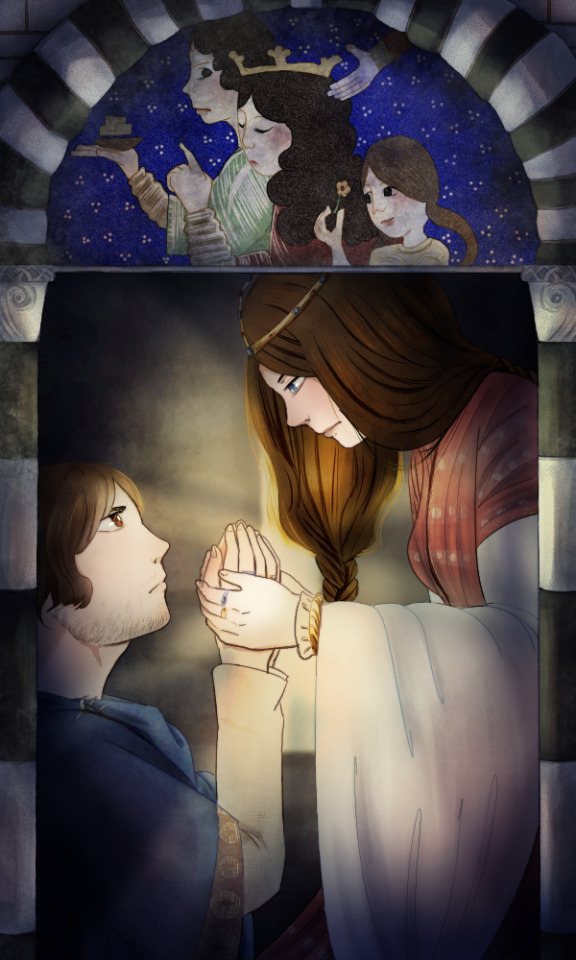
In England, English and Norman barons kill each other to seize the throne and in France, the Carolingian unity having been shattered, the little Capetian king managed his meager possessions under the vigilant and hostile eye of the great feudal lords who watched over over their strongholds and control his every move. Brittany, if it wished, could finally spread its wings. Conan III is careful not to do this and is content to govern peacefully, only too happy that the English and French ropes which hold him by the neck are suddenly so weak. A good duke, good husband, good Breton, he has everything going his way, but was unfortunately a bad father; on his deathbed he disowns Hoël, his son, and chooses as his heir Conan IV, a little boy of 9 years old, the son of his daughter Bertha.
Gilles Martin-Chauffier, Le Roman de la Bretagne
#twelfth century#hoël de cornouaille#bertha de cornouaille#ft konan iii's hand and constance of mayenne i guess 😂#so. I bought the bande dessinée ''Breizh'' bc I'm unfortunately Very Easy and they used this bit from Martin-Chauffier#I agree with historians like Keats-Rohan et al that believe Hoël was somewhat In On It and his spats with Bertha and her husband were#almost always more small-scale (eg how independent Nantes should be relative to the ducal crown etc etc)#but I do sometimes wonder and the BD bit got it rotating again...#given Hoël was iirc the eldest of Konan III's kids and also a dude man in the early 1100's if he was ever tempted by the Cain Instinct...#there's something about Bertha and Hoël largely being allies but also siblings who quarrel on the political stage...#(also an example of the kind of nationalistic writing flourishes I have to wade through every day I'm fighting for my life out here 😭)#(also the idyllic verbiage when Bertha was living in England during said war where the English were killing each other. like...)#shakespeareomnibus
15 notes
·
View notes
Text

Thoughts and Theories about Mary Kreiburg, Joseph, and Count Barriere
TLDR:
What if Mary Kreiburg was murdered?
What if Joseph is someone else, like Mary is with Mary Kreiburg
What if Count Barriere is behind the Racecourse tragedy?
What if Joseph = Count Barriere?
What we know:
Manus de Capet, an Irish nobleman, acquired Oletus Manor. “His noble conduct was very popular. The middle class families in the vicinity hoped to marry off their daughters to him”.
Manus fell in love at 1st sight with Mary Kreiburg, a noblewoman from Austria.


Mary grew depressed after the wedding, supposedly due to “Mary’s lack of suitable social venues”. As a result, Manus built Kreiburg Racecourse for her. The racecourses became the hottest social event in town.


Was going fine until 1 day Mary committed suicide on the racecourse. An ominous air then filled the place. Soon after her death, racehorses “galloped out of the track and caused a fatal stampede”. This got Manus caught in a lengthy lawsuit.


Either due to pressure from the claimants, or sorrow from the death of his wife, it was said “Manus went mad, and he was never seen again”. The manor was sold off by Manus’ creditors.
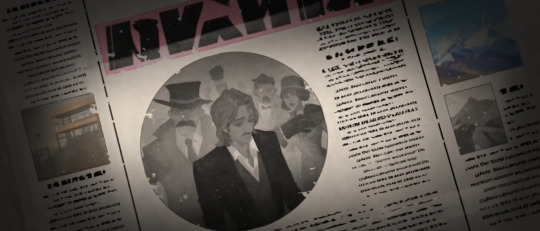
Alice: Manus seemed to love his wife, so why did Mary take her own life? Orpheus: There are theories, such as that she had an affair with a jockey and was condemned for it, she couldn’t take the pressure then took her own life. Some say it was a murder disguised as a suicide.
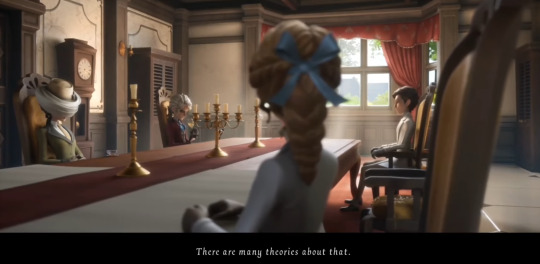
Theory: What if Mary was indeed killed rather than her death being due to suicide?
Manus and Mary were both wealthy, and Manus was already said to have “middle class families” trying to marry their daughters off to him. So it’s possible some were equally interested in Mary
Mary Kreiburg being killed would parallel very well with Marie Antoinette being executed.
Part of the reason for Marie’s death (and why she was unpopular) was for her extravagance (combined with lack of money and food for people at that time), as well as slander against her due to who she was/her family and where she came from, combined with scandals like the Diamond Necklace Affair. So, maybe whoever killed her and why could be related to her wealth (aka greed) or potentially a scandal similar to the Diamond Necklace Affair, especially since Mary’s very first letter is about this event. We do see Mary with a necklace and jewelry in that 1 scene during AoM part 1 before we see Manus making the racecourse for her.


It’s also possible, if she has more similarities to Marie Antoinette, that she could’ve been similarly slandered (had bad things said about her), which maybe could help explain why Marie was so depressed.
Considering the tragedy at the racecourse (stampede) happens soon after Mary’s death, I wonder if the same people that caused Mary Kreiburg’s death could’ve caused the horses to go out of control too? It would at least somewhat parallel what happened to Mary Antoinette’s husband (who was also killed. He even tried to flee to another country, which could fit with Manus disappearing after his trouble with the lawsuit and everything. There were even rumors spread about him too, so maybe Manus being treated and talked about badly after the Kreiburg Racecourse incident would parallel that too).
De Capet, from Manus’ name, could refer to the Capetian dynasty, the ruling family of France from the 10th to 18th centuries, and Louis XVI, Marie Antoinette’s husband, was part of the Capetian dynasty.
Thoughts about Joseph
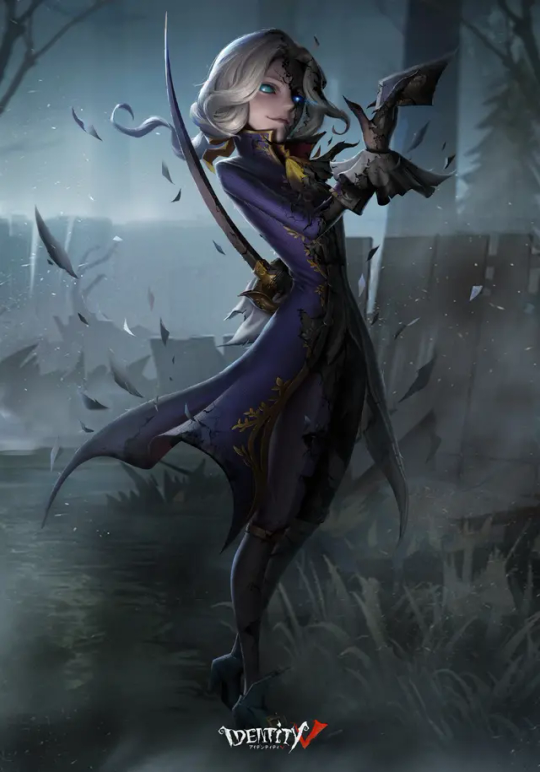
Theory: What if Joseph’s in the main story similar to Mary is with Mary Kreiburg?
He needs a role in the story (not yet in any games or tied to anyone else), but has issues (like Mary does) with the time period he’s from (aka, too long ago)
Joseph’s life goes downhill (essentially starts) due to Mary’s execution. Their stories are related (same time period, region, etc…). Maybe Joseph will appear in the main story once/now that Mary Kreiburg is dead or as a result of her death?
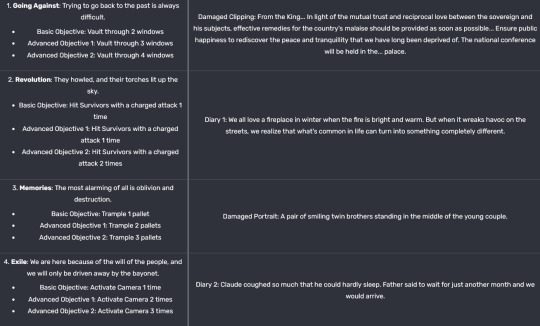
Joseph has a fairly major role in the Truth & Inference story, which has a lot of parallels to the main story, so maybe he could have a fairly big role in the main story as well?


Lived in a manor just like how Mary Kreiburg lived at Oletus Manor when she married Manus.
Mentions “mirror’s realm” and people “reacting to the mirror” in his 3rd letter. Mary uses mirrors in game.
Mary as Mary Kreiburg isn’t the literal Queen Marie Antoinette. She’s someone else, but semi related. Maybe Joseph could be something like that? As in not quite himself as we’ve learned from his deductions and backstory, and isn’t from the time of the French Revolution, but does have similarities. Maybe if this is true, whoever his character is will be someone tied to Mary Kreiburg, or at least knows her/met her.
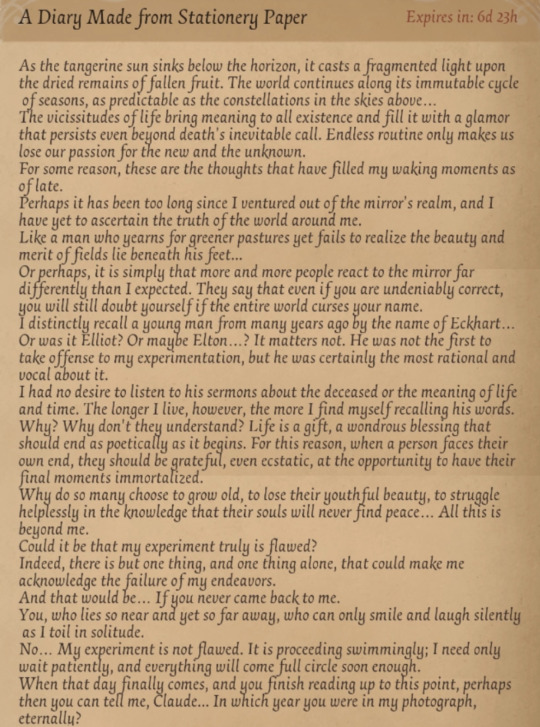
Theory: Count Barriere may be involved with Mary Kreiburg and the Kreiburg Racecourse
Manus bought Oletus Manor, which is owned by Count Barriere, as shown by him owning Orpheus’ debt. So it’s possible Count Barriere knew both Manus and Mary Kreiburg.
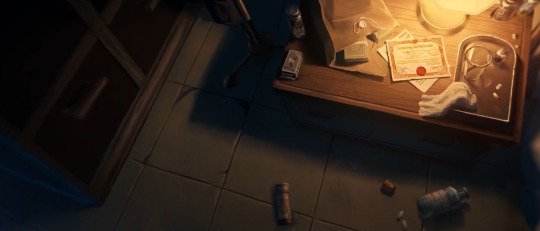
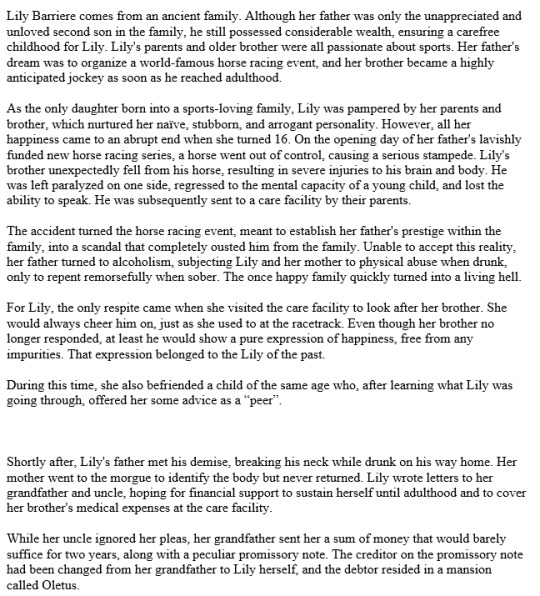
Count Barriere, even indirectly, is related to a lot of other accidents, even if only due to being the owner of the land, including Moonlit River Park and the Hullabaloo tragedy. It’s possible Count Barriere could’ve been behind or the cause of the horse from the Kreiburg racecourse going out of control.

Theory: What if Joseph is Count Barriere

Barriere is a name of French origin, but Count Barriere (likely) is in England. Joseph is French but forced to move to England after the French Revolution.
Both Barriere and Joseph are Counts (as is DM)
Barriere owns the mountain where Oletus Manor is, confirmed by how Count Barriere is the one Orpheus originally owed his debt to before Barriere changed the creditor to be Lily. Joseph also owns a large manor with a lot of servants.
The Barriere family is an old, wealthy family. Joseph also comes from a noble family (from before the French Revolution), and DM with the Melodis family is also an old, wealthy family.
Count Barriere is constantly involved with death and tragedy (Golden Cave mine incident, Moonlit River Park Hullabaloo tragedy, Lakeside Village disappearances, Oletus Manor DeRoss tragedy). Joseph is also involved with death and tragedy, considering he causes many people to go missing due to his experiments and how he traps people in his photo world to try to preserve them (prevent them from growing old or dying). DM is also involved in experiments, and just like Barriere, even if he isn’t the direct cause of the deaths that occur, he is still always behind it somehow or involved in some way.
Joseph mentions trying to “complete this sacred ritual” to see Claude again. Count Barriere, whether he’s involved in rituals, due to his connection to Golden Cave with the eye in there, Hastur with Lakeside Village, as well as Yidhra with Lakeside and Darkwoods (also land owned by Barriere), he does have connections to Cthulhu mythos stuff, and all the deaths he causes could potentially be said to be for a “ritual”.
Joseph is someone who doesn’t often leave his manor or socialize as he spends most of his time with his pictures of Claude or in his darkroom with his experiments (or photo world). Barriere is not someone who has really appeared in social events (though he does start them) or has appeared before anyone yet (from what we know so far).
Joseph’s singular motivation is to see Claude again and does not care about anyone else. Barriere is also someone who does not care for anyone else (not his 2nd son at least, and even Lily, his granddaughter, he only uses for his own ends, aka manipulates). Maybe Joseph causing people to disappear and his experiments could give Barriere some reasons for why he’s doing some of what he’s doing.
#idv#identity v#joseph desaulnier#photographer#idv joseph#identity v joseph#idv photographer#identity v photographer#count barriere#mary kreiburg#idv mary#identity v mary#blood queen#idv bloody queen#identity v bloody queen#sirenjose analyses and theories
30 notes
·
View notes
Text


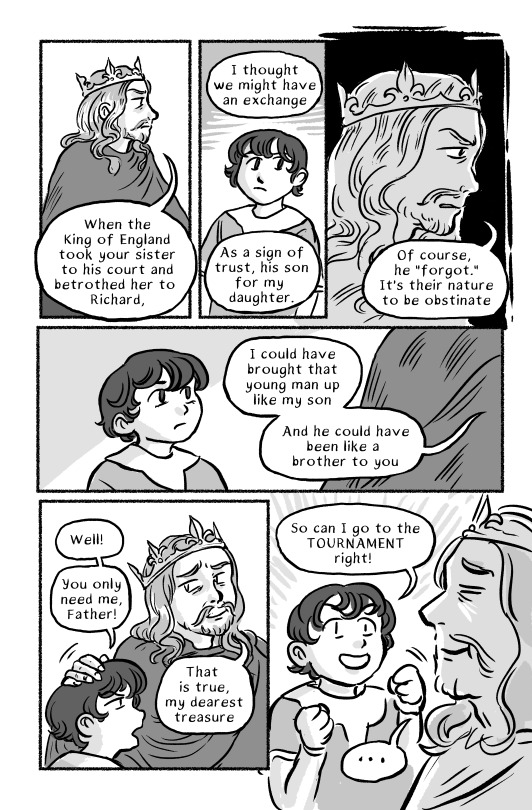
“Leviathan’s Fishhook”
Richard takes a break from suppressing rebels in the south, Philippe has his first rude Brother Experience(TM), and King Louis nurses a grudge against his rival vassal.
Inspired by the account in Matthew Strickland’s Henry the Young King, where he speculates that at some point Louis may have been deceived into giving up Alys to Henry II’s court with the promise that Richard might be given to him. Gillingham takes a much less sympathetic view, saying ‘to lose one daughter was a mistake, but two is carelessness.” Or something to that effect Lol
#philip augustus#Philip ii of France#Louis vii of France#Richard the lionheart#Richard I of England#12th century#comics#medieval#leviathan#Capetians#Plantagenets#Matthew Strickland
29 notes
·
View notes
Text

St. Louis IX of France.
#saints#christianism#catholicism#royaume de france#capétiens#capetians#capetian dynasty#st louis#st louis ix#roi de france#vive le roi
9 notes
·
View notes
Note
i think hima left For the interpretation. But since he looks bigger than England and looks quite near age people usually make him on if the Frankish and Francia too. He's probably western France when the country was divided in three since the middle was quickly swallowed and the western was the part that stayed more or less unchanged through time. I do think his mother died and only then he got to live but I've seen people write him as if he was born much later.
does it change much if he's the son of Frankish though? Wait did he kill his brothers?
I am in no way a French historian - especially mediaeval France. But I know France is a bitch to 'date' because the concept of Frenchness covers a very small area of what's now France, at least until about Napoleon's time.
I agree however! I genuinely think that Charlemagne's empire was its own thing and the splinter into the three Francia's is what sprouted the France, HRE and... assorted dukedoms which eventually got swallowed up by the other two.
I had a draft post where I was desperately vomiting out my issues with carbon dating Francis because he is meant to be older than England but if you say Francis is France and not (West) Francia then Arthur has a good fifty years on him in age right? 927 for Aethelstan versus 987 for the start of the Capetians. Like I'm fairly certain Burgundy, Brittany etc. will have had to have had their own little nations running around. Normandy is also very likely. I know enough about French history to know that for much of the middle ages huge amounts of power lay with the Dukes who swore loyalty to the King of the Franks but that title of King could really be in name only at times etc....
I'm still trying to iron it out. If Francis is older than Arthur... he has to be West Francia. Right? If Gilbert can change who he actually is four times why can't Francis?
It then just makes me go down rabbit holes of 'hey okay wait a second how old is England then', because the concept of English is substantially older than the idea of French.
I'm trying to apply logic to a world system where - just as in real life - the ideology of a nation state is just... not functional (or at least deeply deeply flawed). It's especially not functional as a political unit to make a personification of in 10th century France.
I bet Francis did absolutely knock off the dukedoms one by one if given the chance. Like it took him like 1000 years but he eventually did it with East Francia/HRE too. I'd say more more about Burgundy/Lotharingia/Savoy/Aquitaine but honestly I don't bloody know how the French state functioned until the Bourbons took over. Still, let's say that, if Picardy exists (and is not a gag throw away character which he may well be) and yet Brittany doesn't I will be... very baffled.
I'll stop now. I'm really not knowledgeable in French history to try and iron this out. Also consistency in Hetalia is a losing battle. I know that. Logically. Cough cough.
7 notes
·
View notes